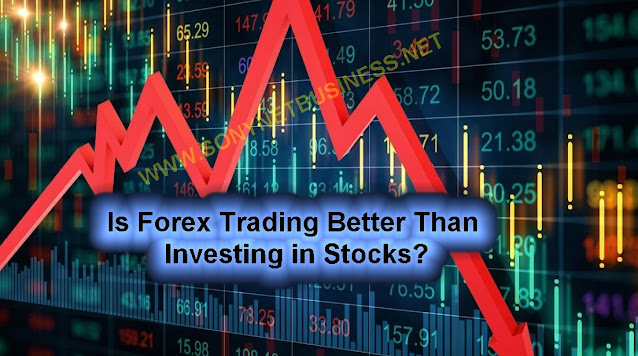 |
| Is Forex Trading Better Than Investing in Stocks? |
Forex trading has experienced a renaissance in the last 12 months, with a slew of new Forex trading firms and projects gaining traction. It appears as if the market had suddenly become popular, with more people turning to day trading.
Brokers tout Forex day trading as the finest option to increase your income or even find a new, simpler full-time employment in every scenario. However, it's natural to wonder if Forex really is the finest way to make money in the stock market. Isn't it preferable to simply invest in the stock market, as many individuals do? As it turns out, there are significant characteristics that distinguish both marketplaces.
Investing in Stocks vs. Investing in Forex
There are various aspects to consider when comparing stock and forex trading. Although we think of the stock market as the be-all and end-all of trading markets, no stock market comes close to the scale of the Forex market. While the stock market trades around $200 billion each day, which is a huge sum no matter how you look at it, the Forex market trades $5 trillion per day on average. That's a factor of several tens of the stock market's size.
While sheer size may not appear to matter at first, it does - especially when considering the Forex market's enormous liquidity. A huge trading market with high liquidity makes it much easier for anyone to enter or exit the market, because the expectation is that there will be someone eager to trade with you whenever you want to.
Consider the following illustration of how market size and liquidity work in the currency market versus the stock market:
You have a lot of stocks in your stock portfolio in the stock market. Assume the stocks are split 50/50, with half going to business A and the other half to company B. One day, Company A's CEO is arrested for a controversy involving a giraffe and a pair of tweezers, causing the company's general reputation to suffer.
You rush to try to sell your shares, only to discover that the controversy is so widespread that no one wants to buy it. You're left with dead stock and the hope that Company A will revive. Nobody will buy it, thus you can't sell it or turn it into liquid. Directly trading A stocks for B stocks is not an option.
Now consider the following scenario in the Forex market:
You've put your entire life savings into Forex and now have half of your money in GBP and the other half in JPY. The Prime Minister of the United Kingdom resigns one fine day following a scandal involving a box of eggs, fungus medication, and a teacup. The value of the pound falls.
Your inclination is to move your savings to another currency as soon as you read this, because this is a scandal that will have a long-term impact on the UK economy. You go to your Forex exchange and search for people trading the GBP/JPY pair, and there it is, someone is doing it.
Someone out there has decided to gamble on the GBP rebounding and, as a result, is buying the currency now while it is cheap. Even if there wasn't, because GBPs are liquid, you could always run and spend your savings in GBP on anything else (like the stock market) without needing anyone else's help.
Do you see the distinction? When it comes to trading values, market size and liquidity are more important than anything else. More people will be trading on larger markets, increasing your chances of finding someone willing to buy from you so you may jump out. Furthermore, because the market is liquid, you can always spend your money. Even in the midst of a major scandal, people all across the world will accept GBP. It will be traded, accepted, and exchanged by banks. Try paying for eggs and milk with Netflix stock and see how it goes.
The Forex Market is open every day of the week, 24 hours a day.
Another significant distinction between shares and stocks is the ability to trade. The stock markets are normally open five days a week during the day, while after-hours trading is becoming more common. This means that if something happens during the night, you won't know how wonderful (or awful) it is until the markets open in the morning.
Because your daily schedule and those of those markets may not coincide properly, the foregoing scenario limits your capacity to trade in international stock markets. This isn't to say that trading international equities is impossible, but it is far more complicated than it should be.
The forex market, on the other hand, is a worldwide phenomenon. These markets are typically open five days a week during the daytime hours, but because to the wonders of time zones, it is always daytime somewhere in the world. As a result, people trade around the clock for five days a week (and a little longer due to time zones).
Trading volumes and currencies naturally fluctuate throughout the day, due to both the market and the local times of the nations to which such currencies belong, resulting in better and worse trading hours depending on your trading pairs. During the hours when Chinese markets are open, especially during Chinese peak time, the Chinese Yuan is naturally traded more. You can, however, trade at any time; it will just take a little more work to find someone who matches your pair.
Some currency are even traded 24 hours a day. International currencies, such as the US dollar, enjoy consistent trade volumes at all hours of the day. Other major currencies have the same problem (JPY, GBP, EUR.) Although they have peak hours, you can locate trade pairs against them at any time, resulting in a market that is accessible from everywhere.
Commissions and prices are lower.
This is a key one when comparing day trading forex vs stocks. While all markets have trading fees, the stock market frequently has significantly larger ones than the Forex market, owing to the lower value per unit and the resulting high liquidity.
While most stock markets impose fees based on a percentage of the traded value, the Forex market uses pips, or fractions of a percentage point of the currency value, with most trades costing between 2-3 pips and some as little as a single pip.
Because you lose a lesser percentage of everything you make on these reduced commissions, you automatically gain more. This is especially true when we consider day trading.
Making Day-to-Day Decisions
Again, forex is built to work on a day-to-day basis by its very nature. The underlying motive is that most firms must make daily decisions in order to achieve their objectives. There are monies set aside to pursue these key components of business health, whether it is obtaining scarce skills or core inputs for production. As a result, that purchasing decision is made somewhere in the world at some point.
Because governments and national borders determine which money is used, demand for a certain currency will be influenced by a range of reasons. On a day when the Federal Reserve announces that interest rates will remain constant, forex traders are likely to maintain their spreads. If the Feds agree to hike interest rates, things will be different. When interest rates rise, the dollar will strengthen because more American investors will consider investing in the country rather than outside.
As a result, if the scenario above occurs, USD pairs will yield more than they would otherwise. A forex trader, on the other hand, cannot hold a set position every day. If he does, there's a good chance he'll lose a lot of money. Similarly, previous stories of US-China standoffs caused the USD to fall as fears of a global catastrophe appeared. The dollar began to surge again as soon as word emerged that the impasse was being eased.
Forex traders must react to market events on a regular basis and structure their trades accordingly in the face of disruptive market participants. Stocks, on the other hand, might be held for a quarter, a year, or longer due to predicted performance and capital gains. In the meanwhile, whether there is a brief market uproar between countries may not matter. Because such a situation is unlikely to last for long, a stock trader could want to stay up to date on the news rather than sell.
If the disputing parties can reach an agreement soon, the stock price may rise when the year-end figures are released. If there are any repercussions on earnings for the period, they may be insignificant enough to have no bearing on the dividends declared and paid for the year.
Inherently Better in Forex Day Trading
 |
| Inherently Better in Forex Day Trading |
There's no need to compare day trading equities vs forex when it comes to day trading. For a variety of reasons, forex is always the winner.
First, as previously said, lesser commissions result in a higher rate of earnings per deal. When day trading, you'll likely be making large trades worth thousands of dollars (or pounds or euros) each, and the commission savings will pile up. On a single, modest transaction, a percentage point may not seem like much, but when you trade tens of thousands of dollars in a day, that percentage point becomes a three-figure sum, huge enough to matter.
The second reason why a single, unequivocal winner emerges when comparing day trading FX versus stocks is due to laws: Authorities in the United States, at least, are less strict in regulating Forex day trading than they are with equities. In fact, day trading the stock market in the United States is so heavily regulated that many people find it hard to succeed. The market is severely constrained due to rules about how much you can invest, how much you must contribute, and even how much equity you can acquire.
Even in the United States, the currency market is significantly more relaxed in this sense. First and foremost, there is no minimum investment required to participate: you can trade forex with as little as $100 in your account. In reality, forex trading is so simple that anyone can open an account and start trading, which is one of the reasons why it has become so popular, whereas stock trading remains hard and difficult for most people.
Then there are the leverage figures: In the United States, the maximum leverage available in the stock market is 4:1. Forex traders, on the other hand, can use leverage of up to 50:1 in the United States, and even greater in the rest of the globe — the standard being 100:1, with some traders going even higher. Higher leverage equals more investible funds, which multiplies the amount of money you can earn.
Stock markets offer a wider range of options.
When comparing forex and stock markets, this is one area where the stock market comes out on top. A stock market allows you to trade shares in a variety of publicly traded and listed companies. Some stock exchanges, such as the New York Stock Exchange, can have thousands of distinct shares, all of which you can invest in if you have the money and the interest.
This isn't true in general for FX. While trading in lesser-known currencies has become more popular in recent years, it is still uncommon – most forex deals involve only eight currencies, known as the main currencies. The USD, CAD, EUR, GBP, CHF, NZD, AUD, and JPY are among the currencies in this list. Other currencies aren't impossible to trade; they're just nonstandard, therefore they aren't available everywhere.
Stocks that are rising in value? Not for the Forex market.
Do you know what a bull market is? Is it a bull market or a bear market? It's a term used in finance circles to describe a market where prices are rising out of control, potentially generating a bubble (bull market), or a market where a commodity or asset is rapidly losing all of its value (bear market).
While currencies do appreciate and depreciate in value every minute, there are significant restrictions to how much a specific currency may appreciate or depreciate in relation to its trading pairs in a given timeframe. It's not a legal limit, but a market one: barring a calamity that fully destroys trust in a currency, markets will always revert.
Because currencies are linked to their countries' economy, the market tends to correct itself, limiting how much money a trader may profit from them. Also, because bull and bear markets grow at different times, they aren't well-suited to day trading, at least not to the extent that mid-to-long-term investments are.
Another thing to remember is that, because forex trading is always done in pairs, anytime one currency's value falls, the value of another currency must rise. As a result, in terms of relativity, currencies may exhibit more inverse behaviour to benefit traders.
Which option should I go with?
There is no obvious answer as to whether forex or the stock exchange is the superior option. Both have advantages and disadvantages, and which is best will depend on your investment objectives.
However, the strengths of each will influence which one you should choose. The stock market is certainly the place to be if you want to perform long-term investing. Shares appreciate more frequently than currencies and are a far better long-term investment than fiat currency. If you want to play the market, on the other hand, forex may be the best location for you. This is due in part to market size, but also to the way leverage works in FX vs the stock market.
Nonetheless, day trading is allowed in the stock market, and firms do hold money in many currencies as a hedge against currency fluctuations. This is due to the fact that we have global operations and multiple payments coming into multiple countries at the same time. Although each market may be better suited to one person or another, FX trading outperforms equities for retail investors seeking short-term gains.














.png)
.png)